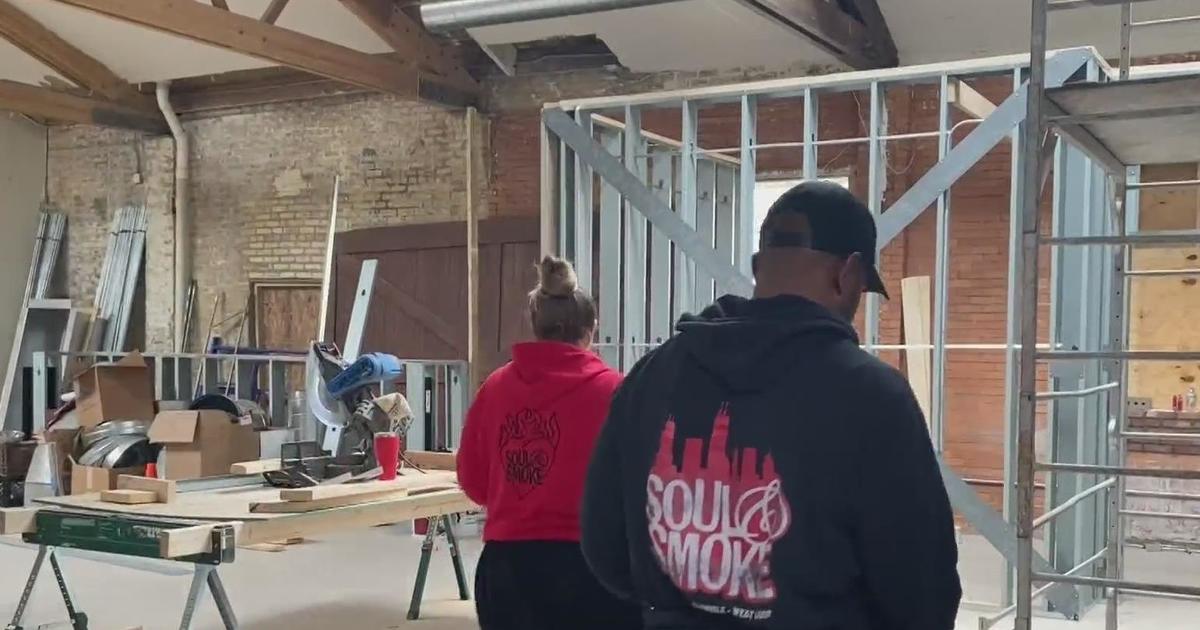A State Order To Prevent Homelessness Is Causing It For Some
CHICAGO (CBS) -- A young mother's dream to provide a home for her daughter was crushed by COVID-19, and they have been left homeless.
CBS2 Investigator Dorothy Tucker discovered that new rules designed to prevent homelessness are actually causing some landlords to lose their homes.
Jillesa Willis showed off the blankets and clothes stored in her trunk in case the weather turns colder. They are in a makeshift closet in the car she and her daughter call home.
She described to us what it's like to sleep in the car: "I put my foot up here and I be content."
Her favorite parking and sleeping spot is in Bronzeville.
"As you can see, there's a lot of activity," Willis said. "Less crime."
Still – safety is a concern.
"You feel yourself going into a deep sleep and you wake up because you have to watch your surroundings," she said.
The car is a last resort. Willis sometimes stays with family until she wears out her welcome. She also looks for homeless shelters to sleep in for a night or two.
Catholic Charities' Homelessness Prevention Call Center gets a lot of calls from people like Willis – especially since the start of the COVID-19 pandemic. Between March 15 and Aug. 15, their call center received 37,342 calls.
The organization helps connect people, both renters and homeowners, who qualify with short-term financial assistance to stay in their homes. There have been a total of 272 requests for mortgage assistance this year compared with just 47 requests last year.
That is a 479 percent increase.
Catholic Charities also connects people like Willis with spots in shelters. They received 3,000 such requests in August 2020 compared to 1,842 in August 2019 – a nearly 64 percent jump.
This summer, they're placing about 200 people a week in shelter beds.
For Willis, staying in a homeless shelter was "not pleasant."
"It was sad," she said. "It wasn't my own."
But Willis does have a place of her own. In fact, she owns a two flat in Auburn Gresham.
She saved every penny for four years and bought it last November.
"My signing off on a home, let alone a two flat, that was something that was not easily [done] at my age," Willis said proudly.
Her plan was to keep the tenant on the first floor, who was paying $800 a month in rent. Willis would move to the second floor.
But, her plan didn't work out. Second-floor tenant Andre Richards, who works as a maintenance man, didn't leave.
Willis said Richards was reasonable at first. But she said he then told her, "I'm not moving out, not paying rent."
And, now he has a dog guarding the property.
With Richards refusing to leave or pay rent, Willis struggled to make the $1,300 mortgage. And she couldn't afford to rent another place.
She's an office worker, making $16 an hour.
"I can't afford to pay the mortgage and pay on my other bills," Willis said.
Willis took Richards to eviction court and won. The order came down March 16.
But five days later, the state shut down. Businesses closed and workers were furloughed. And then Gov. JB Pritzker issued a moratorium on evictions – stalling 1,700 evictions by Cook County Sheriff's police.
It was an effort to protect renters from becoming homeless.
"They're doing it to protect the tenant but what about the owners? What about the landlord?" Willis said.
There are exceptions to the no-eviction rule. For two major ones, if the tenant is endangering the lives of other tenants or poses a direct threat to the property that could endanger lives, the sheriff can still evict.
Since the moratorium, there have been 12 emergency evictions carried out.
But Willis and her daughter sleeping in their car? That doesn't qualify as an emergency.
"Sorry," is the answer Willis heard from the sheriff's office. "Silence" is what we got when we asked Gov. Pritzker's office to comment on Willis' plight.
"I can't provide for my daughter as a parent," Willis said. "That's what hurts the most that I can't provide a safe home – which I thought I was doing when I purchased the building."
But sleeping in a car is Willis' reality for the immediate future. Why?
Because first, the governor extended the eviction moratorium until Sept. 21. Then came another blow – the federal government, under the Centers for Disease Control and Prevention, issued a nationwide moratorium on most evictions until the end of the year.
Recently, more than 100 small landlords jumped on a Zoom call venting their frustration with the moratoriums and invited CBS 2's Tucker to listen in.
One said: "We're really in such unprecedented times. It's surreal."
Another commented, "This is people's livelihoods."
Among those on the call was Katrina Bilella. While she worked out of state, she rented her Logan Square condo to Filemon Avila and Gabriella Almaraz.
When the pandemic hit, both her tenants lost their jobs and stopped paying rent, nearly $2,000 a month.
"By the end of the year, they will owe me about $20,000," Bilella estimated.
She's not sure if her tenants are currently working, but she is sympathetic.
Bilella told us what she told the tenants: "I'm not expecting full rent. That's not an option. Can you help me out? Can you give me a little bit, with 25 percent or something?"
She even pleaded with them via email: "Would it be possible to work something out?"
And then an ironic twist of fate, Bilella said she wrote to her tenants, "I just received news that I was laid off due to COVID-19," she said she wrote to her tenants.
But they never replied.
So instead of living in her own home, Bilella is now staying with family in New York. And her tenants?
"I'm just paying for them to live in my unit," she said.
Bilella started the eviction process and also started collecting signatures on a change.org petition she created for Gov. Pritzker.
"Asking him to amend the eviction moratorium so there are incentives in place for tenants to work with their landlords," she described the goal of her petition.
She never sent it to the Governor, but the CBS 2 Investigators did. At a recent news conference, it was clear the governor got our emails – and had a message for landlords.
"We're absolutely going to look at that. Let me remind you, our goal here is not to deprive landlords," he said.
While the governor reviews the eviction moratorium, Willis remains homeless.
"It's very wrong," Willis said. "I changed my spending habits, doing the right thing, yet I'm sleeping in my car. I wouldn't wish this situation on nobody."
CBS 2 reached out to the tenants. An attorney for Bilella's tenants said he's willing to have a discussion about next steps. Willis' tenant hung up on us.
Both landlords worry about the coming months, because in October, they'll have to turn on the heat and pay that bill.
The Illinois Housing Development Authority (IHDA) recently stopped accepting applications for its Emergency Mortgage Assistance Program in early September. IHDA says almost 20,000 homeowners applied.
Only half will share the $150 million pot of money, funds received through CARES Act legislation. Each of the nearly 10,000 homeowners who will get help will receive a grant of up to $15,000. Notifications and disbursements begin in September and run through November.
IHDA described the need for both mortgage and rental assistance as overwhelming and urges Congress to pass another COVID-19 relief bill.
At the federal level, small landlords could qualify for Small Business Administration Economic Injury Disaster Loans.
The City of Chicago also recently offered some mortgage assistance to homeowners through a lottery system.
Cook County told us in a statement: "In the coming weeks, we will launch a variety of programs offering mortgage, cash, grant, and supportive assistance for communities and businesses."






